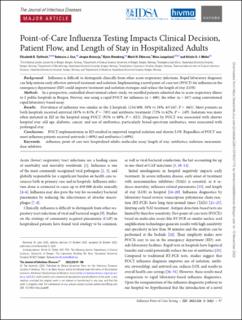Point-of-care influenza testing impacts clinical decision, patient flow and length of stay in hospitalized adults
Fjelltveit, Elisabeth Berg; Brokstad, Rebecca Jane Cox; Østensjø, Jørgen; Blomberg, Bjørn; Ebbesen, Marit Helen; Langeland, Nina; Mohn, Kristin Greve Isdahl
Journal article, Peer reviewed
Published version

Åpne
Permanent lenke
https://hdl.handle.net/11250/3032009Utgivelsesdato
2022Metadata
Vis full innførselSamlinger
- Department of Clinical Science [2318]
- Registrations from Cristin [9791]
Sammendrag
Background
Influenza is difficult to distinguish clinically from other acute respiratory infections. Rapid laboratory diagnosis can help initiate early effective antiviral treatment and isolation. Implementing a novel point-of-care test (POCT) for influenza in the emergency department (ED) could improve treatment and isolation strategies and reduce the length of stay (LOS).
Methods
In a prospective, controlled observational cohort study, we enrolled patients admitted due to acute respiratory illness to 2 public hospitals in Bergen, Norway, one using a rapid POCT for influenza (n = 400), the other (n = 167) using conventional rapid laboratory-based assay.
Results
Prevalence of influenza was similar in the 2 hospitals (154/400, 38% vs 38%, 63/167; P = .863). Most patients in both hospitals received antiviral (83% vs 81%; P = .703) and antibiotic treatment (72% vs 62%; P = .149). Isolation was more often initiated in ED in the hospital using POCT (91% vs 80%; P = .025). Diagnosis by POCT was associated with shorter hospital stay; old age, diabetes, cancer, and use of antibiotics, particularly broad-spectrum antibiotics, were associated with prolonged stay.
Conclusions
POCT implementation in ED resulted in improved targeted isolation and shorter LOS. Regardless of POCT use, most influenza patients received antivirals (>80%) and antibiotics (>69%).
